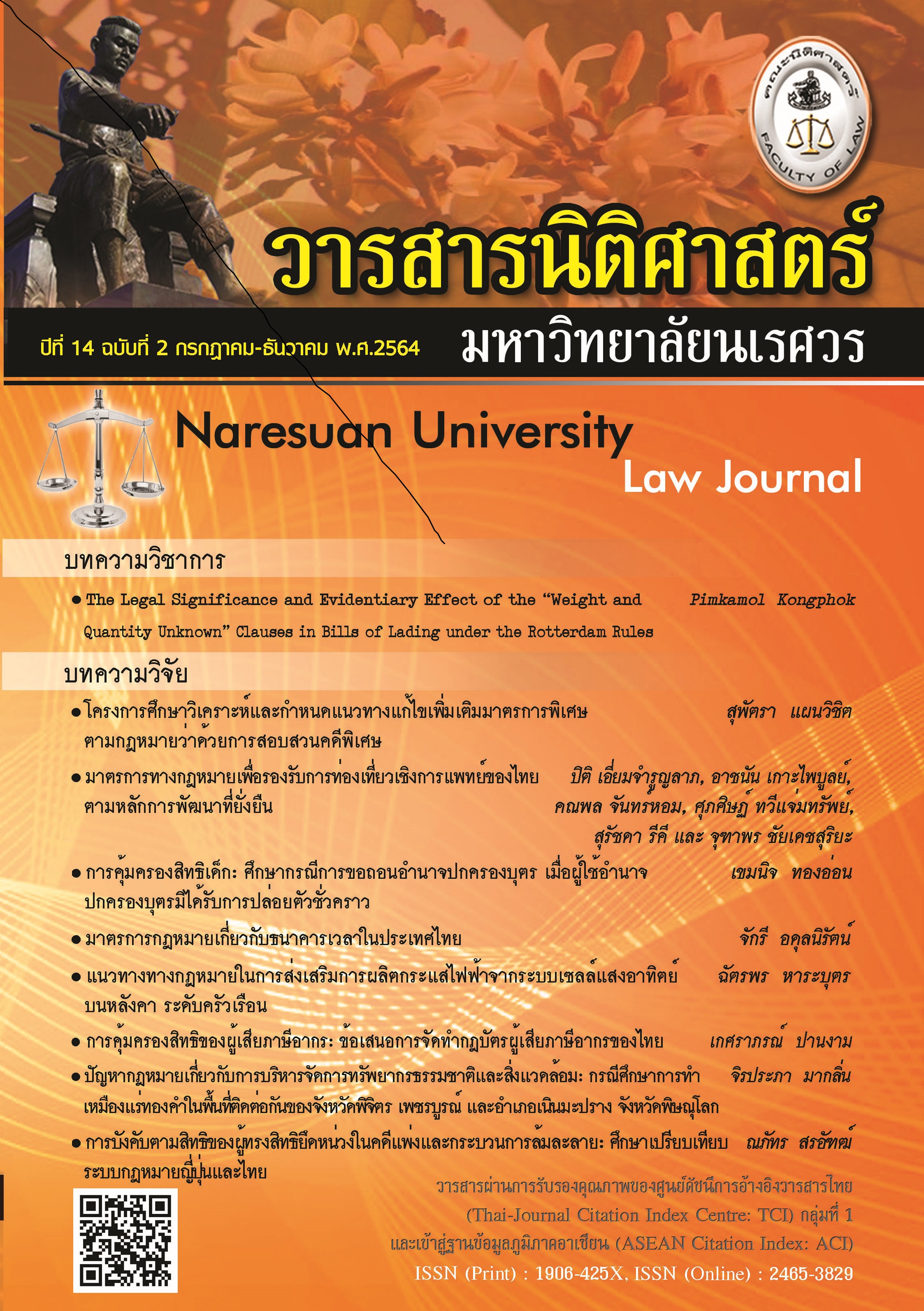Legal Measures for Medical Tourism in Thailand for Sustainable Development
Main Article Content
Abstract
The research aims at reviewing existing statutes and subordinate laws relating to medical practice and public health in Thailand as well as in the United Kingdom, Malaysia, Singapore and India. It analyzes harmony between existing legal environments in Thailand and policies on medical tourism hub and proposes amendments to and development of medical practice and public health laws to support medical tourism. The research begins by addressing and analyzing laws and regulations relating to a value chain of medical tourism by relying on a doctrinal method together with performing functional comparative analysis with an aim to analyze impacts on legal measures on medical tourism. According to the findings, readiness of Thailand’s legal measures on medical tourism is high compared with other countries in the region as reflected through the evaluation scores. Despite falling behind Malaysia, Thailand achieved a higher score than Singapore and India. This is because laws and regulations relating to medical tourism in Thailand are capable of support growth of medical tourism and are being supported by a clear national policy towards medical tourism. In addition, the government can take actions to enhance competitiveness of the country for medical tourism. It is recommended that the Thai government should develop laws and regulations relating to the visa process to promote traveler comfort, develop laws and regulations to allow free labor movement for flexibility of medical practice, ensure flexibility and transparency of medical service fees, and develop a dispute resolution system for disputes arising from medical services. To ensure sustainable development, the government shall collect special fees from medical tourists which will be subsequently allocated to subsidize the public health system for Thai citizens.
Article Details
References
Bakar, Baharuddeen Abu. “Civil Litigation Negligence and the Malaysian Advocate Part 1.” IIUM Law Journal 20, no.1 (2012): 29-49.
Bennie, Rebecca. “Medical Tourism: A Look at How Medical Outsourcing Can Reshape Health Care.” Texas International Law Journal 49, no.3 (2014): 583-600.
Connell, John. Medical Tourism. Preston UK: MPG Books Group, 2011.
Cortez, Nathan. “Recalibrating the Legal Risks of Cross-Border Health Care.” Yale Journal of Health Policy, Law, and Ethics 10, no.1 (2010): 1-89.
Department of Health Service Support. Thailand as World Class Health Care Provider B.E. 25560-2569. Nonthaburi: Department of Health Service Support, 2016. [in Thai]
Government of India. “E-Visa Application Process.” Accessed September 20, 2021. https://indianvisaonline.gov.in/evisa/tvoa.html.
ICA. “For Social Visit/To Seek Medical Treatment.” Accessed September 20, 2021, https://www.ica.gov.sg/enter-depart/extend_short_stay.
Izadi, Morteza et al. “Medical Travel: The Ethical and Legal Challenges.” International Journal of Travel Medicine & Global Health 1, no.1 (2013): 23-28.
Malaysia Healthcare Travel Council. “Healthcare Travel Made Easy.” Accessed September 20, 2021. https://mtm.malaysiahealthcare.org/our-services/evisa/.
Michaels, Ralf. “The Functional Method of Comparative Law.” In The Oxford Handbook of Comparative Law, edited by Mathias Reimann and Reinhard Zimmermann, 340-343. New York: Oxford University Press, 2006.
Ministry of Health. “Fee Benchmarks for Private Sector Fees.” Accessed September 20, 2021. https://www.moh.gov.sg/cost-financing/fee-benchmarks-and-bill-amount-information/fee-benchmarks-for-private-sector-charges.
Pacolet, Jozef, and Wispelaere, Frederic De. “The European Health Insurance Card: Reference year 2015.” Accessed September 20, 2021. https://ec.europa.eu/social/BlobServlet?docId=18642&langId=en
Pitakdumrongkit, Kaewkamol. “Governing Medical Tourism: The Roles of Singaporean Government.” Thailand and The World Economy 38, no.1 (2020): 29-53.
Podlaski, Alison. “Toward an International Constitution of Patient Rights.” Indiana Journal of Global Legal Studies 23, no.2 (2016): 893-924.
Singapore Mediation Center. “Dispute with Healthcare Institutions.” Accessed September 20, 2021. https://www.mediation.com.sg/service/healthcare/.
Wahed, Hanis. “Ethical and Legal Issues in Medical Tourism.” IIUM Law Journal 23, no.2 (2015): 235-237.
World Medical Association. “WMA Statement on Medical Tourism.” Accessed September 20, 2021. https://www.wma.net/policies-post/wma-statement-on-medical-tourism/.


